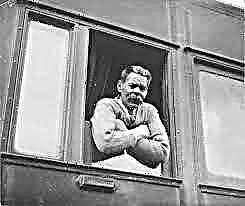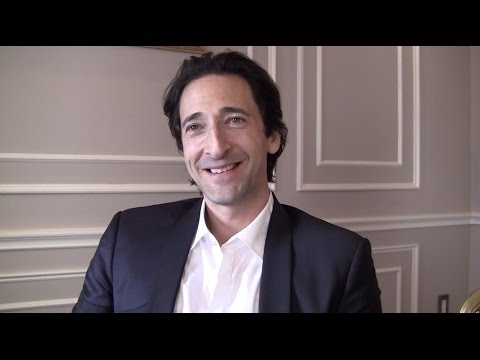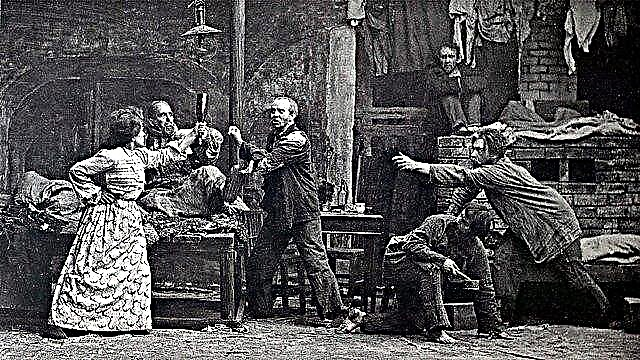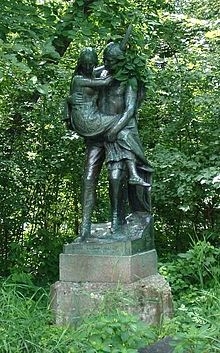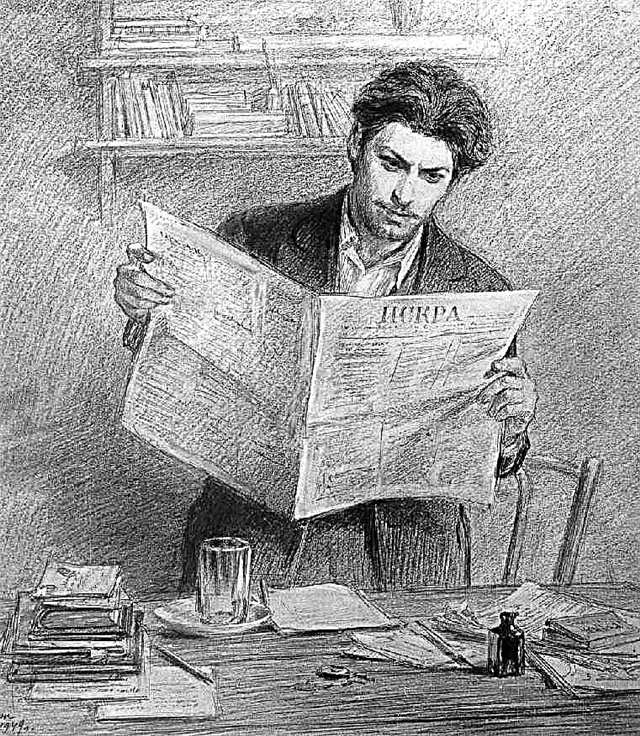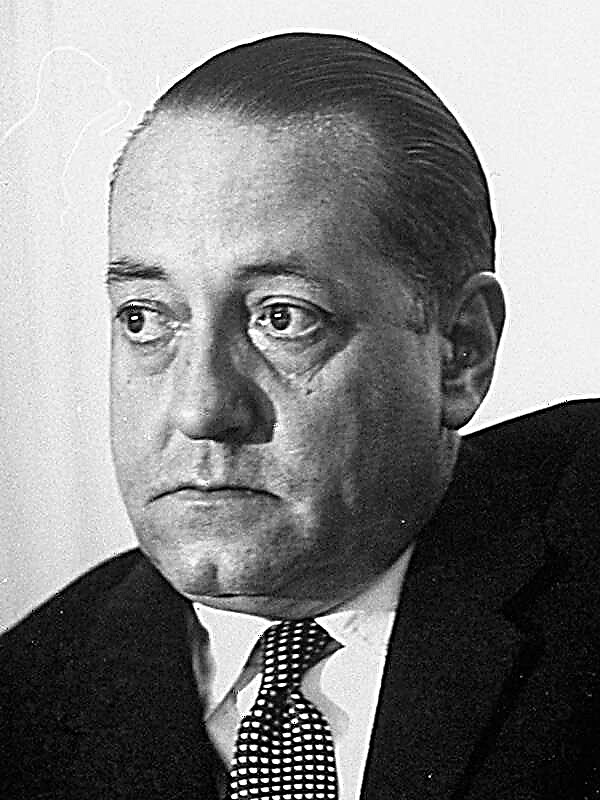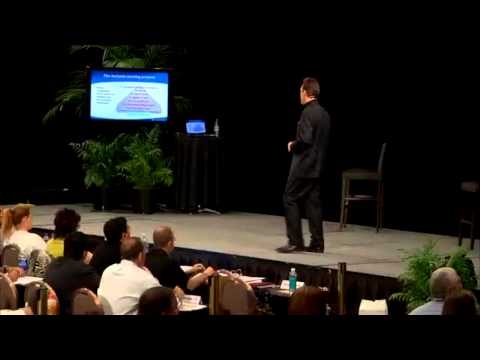The medieval novel about Alexander the Great (356–323 BC) offers its own version of the acts of the great commander of antiquity, saturating the story with the most incredible events. From the very beginning, the author convinces the reader not to believe those who say that the Macedonian king Philip is Alexander’s father. In fact, Alexander’s father is the Egyptian king and sorcerer Nektonav.
The Egyptian sages say that Nektonav lost his royal dignity by taking up the sorcery, but it immediately turns out that the sorcery of Nektonav was of great value to the state, since Nektonav defeated his enemies with the help of witchcraft, thanks to which Egypt lived in peace.
The author of "Alexandria" tells in detail how Nektonav is a magician - how he launches boats in a copper tub, how he manipulates wax men. But there are forces in the world that are superior to Nectonava: many warlike peoples attack Egypt, and then Nectonava understands that everything happens according to the will of the Egyptian gods, which must be obeyed. Nektonav, seeing that the end of his kingdom is coming, fled to Macedonia, changing his appearance and grabbing gold.
After the flight of Nectonava, the Egyptians receive a strange and yet incomprehensible prediction from the god Serapion living in the underworld: "Your king who has fled will again return to Egypt, but not old but young, and will defeat your Persians." This is how the fate of the son of Nektonava, Alexander of Macedon, is predicted. Egyptians write down the words of Serapion on the basis of the statue of their escaped ruler.
Nektonav becomes famous throughout Macedonia, predicting the future, so that even the Queen of the Olympics comes to him at night for advice when her husband, the Macedonian king Philip, goes to war.
Seeing the beauty of the Olympics, Nektonav penetrates her passion and begins to so skillfully care that it reaches the desired. His sorcery makes an indelible impression on the Olympics: Nektonav knows all the intricacies of his craft - he is expert in astrology, compiles horoscopes, interprets dreams and signs, predicts fate by lambs. For fortune-telling, Nektonava has a special “plaque” decorated with gold with the image of the sun and planets of precious stones, on which the Olympics marvels.
Assessing the situation in which the Olympics fell (Philip lost interest in her), Nektonav predicts that she can regain her husband’s disposition if she gives birth to a son from God. Nektonav, in fact, plays a whole theatrical performance before the Olympics: he kills a young ram, puts his horned head on himself. Having taken an ebony rod, Nektonav leaves in snow-white clothes in a bedroom where the Olympics lies on a bed. In the end, the Olympics so much like coming to her that she asks Nektonava: “Will this god come to me yet, for he loved me very much?”
Philip at this time has a dream that the Olympics conceived from the god Amon and a son born of this connection will avenge in the future Philip.
The returning Philip is now happy, now upset by this course of events, but appeared to him in the form of a whistling “great snake”. Nektonav convinces the king of the divine origin of Alexander. However, even then, Philip thinks - I do not know what kind of god - and Amon, and Apollo, and Asclepius.
Alexander's exclusivity is emphasized by various predictions and signs that occur both before his birth and during him. A sign about the fate of Alexander is sent to Philip: he sees a bird fly up to his knees and leave an egg, the egg falls to the ground and breaks, a small serpent crawls out and crawls around the egg several times, trying to climb back, but only slips its head and dies. The philosopher Antiphon explains to Philip that the son born to him will conquer the whole world, but die in a foreign land (which is true).
Seeing the newborn Alexander, Philip again falls into complex feelings: he wants and does not want to raise him, but stops at the first, convinced of the divine origin of Alexander, as well as in memory of the deceased son from his first wife.
Alexander's appearance is also exceptional: he does not look like his father, nor his mother, much less Philip; his hair resembles a lion's mane, one eye is black and the other is gray, teeth are sharp, like a snake. With all his appearance, Alexander again resembles a lion, he is quick in movements and "bright" face. Later, the Persians are surprised at his short stature.
The name of Alexander gives Philip, who is engaged in his education. Alexander receives a brilliant education (suffice it to say that Aristotle himself taught philosophy).
Already at the age of twelve, Alexander took part in the hostilities of Philip, whom he considered his father.
Once Alexander asks Nectonava to show him the stars, when they leave the city in the evening to better view the sky, Alexander pushes him down because, as he says, Nektonav, not knowing earthly affairs, teaches heavenly wisdom. Before his death, Nektonav reveals to Alexander the secret of his birth, and, imbued with his son's love, relates his body to the Olympics, which only at that moment finally understands that Nektonav defeated her with his witchcraft and appeared to her under the guise of the god Amon.
Once the grooms lead Philip an unbridled cannibal stallion, Philip orders to imprison him in an iron cage and throw him to eat criminals sentenced to death. Soon, the Delphic oracle predicts to Philip that the whole world will be conquered by one who passes through Pella (the capital of Macedonia) on a horse with an ox's head on it. That horse will be called “Cow's Head” (in the tradition more familiar to us - Bucephalus, or Bukefal). Philip, having heard the prediction, reflects in bewilderment that this will be some kind of new Hercules.
When Alexander turns fifteen, he passes by the cage where the horse is kept. Alexander hears a terrible neighing, sees human bones scattered around a horse. The future great commander drives away the watchman, opens the cage, takes the horse by the mane and tames him, and then rides him around the city.
The groom tells Philip all this. In joy, Philip kisses Alexander and gives him the words of the Delphic oracle.
Once, Alexander asked Philip to Pisa for the Olympic Games. There he meets with Nicholas, the son of the king of Arkan. Nikolai starts a quarrel and even spits in the face of Alexander. Raised Alexander is kept from anger, but promises Nicholas to "torture <...> to death." In a chariot contest, Nikolai, thanks to Alexander’s cunning, falls from a crashed chariot and dies.
When Alexander wins his first victories, Philip “lets go,” that is, he actually drives the Olympics away from him and marries Cleopatra. But Alexander, who appeared at Philip’s wedding, first kills Lusia (or Lusia - the name’s form is not entirely clear in the Old Russian text), the brother of the new wife, expels Cleopatra and brings Philip the Olympics, while Alexander solemnly proclaims Philip his father.
Alexander refuses to pay the usual tribute to the Persians, threatening that he will take from Darius what he has already been paid.
The Thessalonian ruler Pausanius decides to marry the Olympics, he sends ambassadors and gifts to her in order to persuade the Olympics to leave Philip and marry him. The Thessaloniki comes to the Olympics, where he mortally wounds Philip and wants to kidnap the Olympics. At this moment, Alexander returns from a victorious war. He immediately intervenes in the events, wounds Pausanias and asks the dying Philip what to do with the captured offender. Alexander puts a knife in Philip's weakening hand, and he kills Pausanias. At this dramatic moment, Philip realizes that the prophecy given by Amon the Olympics is coming true, and that Alexander avenges his insult. With this thought, Philip dies.
At eighteen, after the death of Philip, Alexander becomes king, he makes a number of victorious campaigns. While in Asia, Alexander receives an insulting letter from Darius, who, along with the letter, gives him a whip, a ball and a casket of gold. The lash means that Alexander still needs to learn, the ball - that he is small and must play with his peers, and gold - in order to maintain the army until he returns home. In his letter, Darius also promises that he will capture Alexander and he will be crucified. In a response letter, Alexander gives his interpretation of the gifts received: a lash means the speedy subjugation of the Persians by Alexander, a ball means the whole world that he will possess, and gold is a tribute that the Persians will have to pay.
In a difficult battle with the Persians, the Macedonians win, Darius escapes, and his family is captured. Alexander sees a dream in which the god Amon, who appeared to him in the form of Hermes, advises him to go to Darius under the guise of his own ambassador, which he does, but at the feast he is recognized by one of the close associates of the Persian king, and Alexander flees. Soon he succeeds in finally defeating the troops of Darius, who was wounded by his own nobles, who planned to receive a reward from the Macedonian king. Alexander renders royal honors to the dying Darius, and he instructs him to take care of his family, and gives his daughter Roxanne as a wife.
Further, the narrative includes letters as if written by Alexander to the widow of Darius, Roxanne, the mother of the Olympics and Aristotle. In the letters, Alexander tells not only about the victory over the Persians, but also about the strange countries in which he visited, where he saw giants, people with the guise of lions, fleas the size of toads, etc. Once the Macedonians sail to some island , where they hear Hellenic speech, but do not see the speakers. Some daredevils decide, leaving the boats, to reach the island, however, cancer immediately crawls out of the water and pulls them along. Frightened Macedonians are returning to the earth. Alexander reaches the "land of the blessed", where there is no sun, no moon, no stars - only a dawn. Two birds in human form tell Alexander to return and walk on the land that is defined for him.
After defeating Darius, Alexander opposes the Indian king Pore. Alexander, penetrated to him under the guise of an ambassador, Por shows a lot of animals (elephants), which he is going to release on the Macedonian army. Upon returning, Alexander orders to put in front of his army a series of red-hot copper statues. Elephants attacking the statues are burned and do not risk attacking the soldiers. The battle ends with a duel between Alexander and Pore, in which Alexander kills the Indian king. And in the duel, Alexander is lucky: he kills Pore when he turns around to some kind of noise that happened in the Indian army.
After that, Alexander goes to the “wise men” of the Rahmanas (Brahmins), with whom he conducts philosophical conversations.
After conversations with the Rahmanas, Alexander wants to see their elder, and he is brought to a man lying on foliage. In front of a man are figs, melon and other vegetables. In response to kissing Alexander Dandamy (the so-called “abbot” of “wise men”) does not even get up and worship him as a king, saying only the word “rejoice” to him as a greeting. To the question of Alexander about his property, Dundamy answers that they have land, trees, light, sun, stars and water. If they want to eat, they go to the fruit-bearing tree, on which new fruits ripen monthly. They have the Euphrates River, they have wives. Hearing the answer of Dundamia, Alexander turns to all the rahmanas: "Ask me what you want, and I will give it to you." Then the rakhmans in chorus ask Alexander for immortality, to which the king of Macedonia replies that he does not have such a right, and God controls the human life. Having said this, Alexander brings Dandamia gold, bread, wine and butter, asking to accept in memory of him. Dandamy, laughing, refuses all the gifts, accepting that the Macedonians should not suspect them of pride, only the oil that he, having laid a fire in front of Alexander's eyes, pours into the fire ...
In India, the Macedonian king visits the sanctuary, where two talking trees with the gift of divination grow. Trees predict Alexander a quick death away from home.
On the way to Persia, Alexander, under the guise of his commander Antiochus, penetrates the Queen of Veronia Kandakia. Seeing the riches shown to him, Alexander remarks: “It would all be worthy of surprise if it belonged to the Hellenes, and not to you.” Candacia tells Alexander that she understands who is hiding under the guise of Antiochus, showing him a portrait secretly made from him. Alexander draws his sword to kill himself and her, but the tsarina promises to save Alexander “from the barbarians” for the service rendered to her son earlier.
Then Alexander the Great makes a trip to the wonderful lands, where he meets people with doggies, with eyes and mouths on his chest, people with six hands. While wandering, he finds himself in the Amazons, with whom he does not fight, but levies tribute, and then on to some big island where the “Sunny City” stands; the city blinds Alexander with the decoration of gold and precious stones. On the way, he sees many more miracles, after which he returns to Babylon. During the absence of Alexander against the Olympics, a rebellion is rising, led by the commander Antipater. Antipater, frightened that the returning Alexander would avenge his mother’s grievances, sends his son to him, who, through the cupcake of Yul, gives Alexander poison.
Thirty-two-year-old Alexander dies long, saying goodbye to his army. After much debate about where to bury him, they stop at Alexandria, the city that he himself founded.
The author summarizes the historical deeds of Alexander the Great: he conquered twenty-two barbarian peoples and fourteen "Hellenic" tribes, founded twelve cities, calling them Alexandria.



